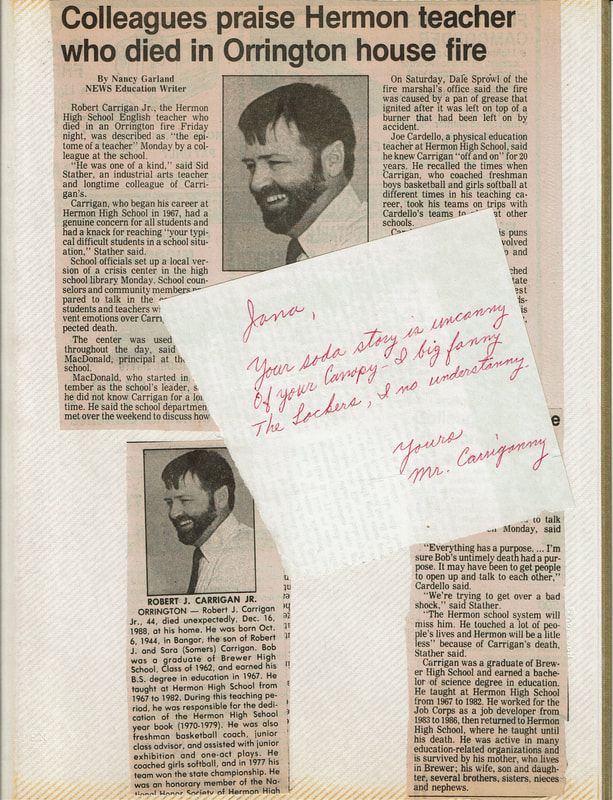|
Teacher Last week, I shared "When the Crowd Parted", the first of two rejected short stories I submitted to the Chicken Soup for the Soul series last summer. Today, I give you the second short story, titled "Sonnet-worthy". But first, I would like to tell you a little anecdote that contributes to the main story: Sometime during the Fall semester of 1988... I was a Senior in high school and my cup runneth over with dramatic fodder for teenage poetry. I was writing several poems a day, it seems. All my feelings poured onto paper and rarely shared. One day, I showed three poems to my best friend and she encouraged me to show them to our senior English teacher, Mr. Carrigan. She stood by my side as I handed them over to him as he sat as his desk. Red-faced and tripping over my words, I asked if he would read them and tell me what he thought. He smiled and said he would. I wish I still had the poems I wrote. I have no idea what happened to them. I only know the subject matter based on Mr. Carrigan's written response, which thankfully, I did save and keep in a scrapbook along with the newspaper articles about his death. His response was lighthearted and personal. He was kind enough to protect my fragile teenage ego by taking a few moments to humor my request. It may have seemed insignificant to him at the time, but his response had an impact on my future writing. Sonnet I don't recall if the events above occurred before or after the events in the short story I submitted to Chicken Soup. I only had Mr. Carrigan as a teacher from September until his death in mid-December, but his teaching style and personality affected me greatly. I submitted "Sonnet-worthy" under the subject Teachers, which the website broadly described as stories about a teacher who you admire, or who changed your life, or had an impact on you in any significant way. It involves two Shakespeare Sonnets, #18 and #130. Below is a video of my favorite Doctor (#10), David Tennant, reciting Sonnet 18. He does a fine job of it, however, I wish I had a recording of Mr. Carrigan's interpretation... There should be two "n"s in Tennant and two "l"s in William, yes? And now the story... Sonnet-worthy “Shall I compare thee to a summer’s day?” Mr. Carrigan’s voice burst out over our heads and echoed off the poster-covered classroom walls. Dylan, Joplin, and Hendrix absorbed his booming oration, as they had many times before. Most of us in the class had heard the opening line to Shakespeare’s famous Sonnet 18, yet few of us knew the rest. The girls lifted their gazes and sat up straight in anticipation, while the boys rolled their eyes and slumped in their seats. Mr. Carrigan smirked, looked around at the predictable reactions, and threw his arms out wide. “Shall I compare the to a summer’s day?” he repeated. He paced before us, smiling, eyeing each one of us as if choosing his prey. He took a step toward a desk in the second row to my left, where one of the prettiest, most popular senior girls sat. Mr. Carrigan stood beside her and placed his hands over his heart with a grand gesture while he continued to recite the sonnet from memory. “Thou art more lovely and more temperate…” The girl smiled demurely, as if she never expected such an open expression of adoration. She fluttered her eyelashes and touched her blonde, silken, perfectly coiffed hair. She looked around at her classmates to make sure we noticed how surprised she was to be in the spotlight. The boys snickered in half-hearted attempts to mask their own desire to trade places with Mr. Carrigan. Every one of them would give their left arm to have such access to the most beautiful girl in the entire school. Every day, they jockeyed for her undivided attention and claimed victory if she merely batted her eyes at one of them. Each of the girls, including me, wished to trade places with Miss Popular. I dreamed that someday a man would recite poetry to me with such beauty, reverence, and love. I yearned to be the worthy subject of such overt adoration. My envious, teenage heart ached with every word of the sonnet. Miss Popular was tall, thin, and pretty. She was everything I wanted to be, but would never achieve, and yet again, she sat in the spotlight, the star of the show. I on the other hand, was the most dreaded of adjectives. I was average. I was not the smartest student, although I was near the top of my class, not the most athletic, although I played sports, and not the most talented, although I played in the band. My short, stout frame combined with my dark curly hair, thick eyebrows and a square jaw ensured that the boys in school would never consider me an example of feminine beauty. No one would ever recite Shakespeare’s 18th sonnet to me. No one would ever compare me to a summer’s day. No one would ever write a lovely poem for me. I hated to admit, as Mr. Carrigan fawned over the girl, that he had chosen wisely. She was, indeed, more lovely and more temperate. Mr. Carrigan’s voice rose even more as he recited the last line of the sonnet. “So long lives this, and this gives life to thee.” He stepped backwards away from the girl’s desk and gave a little bow. He returned to the front of the class with his arms spread wide above his head, allowing the moment to settle and fade. He commanded silence without a word and scanned our faces with a twinkle in his eye. Then, like the flip of a switch, his mood changed. I had the feeling we were witnessing a stage performance, as if he was at the Globe Theater in front of the Royal Family. He scratched his beard and gazed at the posters on the walls. My eyes followed his, suspecting none of his actions were random. Mr. Carrigan was cunning, calculating and wise. He knew how to run a high school classroom. He had his finger on the pulse of the teenage mind and if he knew comparing Shakespeare to Bob Dylan was a smart move, I wondered what other smart move he was now contemplating. He resumed his track back and forth at the front of the room, his brown loafers curling heal-toe, silent and deliberate. He looked pensively at the floor, again scratching his beard. We waited with silent anticipation. He paused in front of my row, where I sat two desks back. He stood sideways with his arms folded across his chest and sighed heavily. His eyebrows knit together in tortured thought. He started to speak, and then paused. He began again, speaking in an aside, as if thinking aloud. “My mistress’ eyes are nothing like the sun; Coral is far more red than her lips red;” He continued speaking Shakespeare’s Sonnet 130 in conversational tone, slow, pensive, looking to the ceiling, the walls, and the floor as if he expected to find his next words there. As he spoke, he inched between the desks toward me. I thought he would pass me by. I thought his target must be someone in the back. No one ever singled me out. I was never the star of the show. He stopped at my desk and leaned on the corner, his eyes shifting from the floor to the wall to the ceiling, but clearly directing his speech at me. “If hairs be wires, black wires grow on her head…” Muffled laughter punctuated the air. Mr. Carrigan’s voice faded in my ears as I withdrew into myself. My face grew hot as he continued to recite the unflattering verse. “And in some perfumes is there more delight Than in the breath that from my mistress reeks.” More laughter, louder this time. I wanted the Earth to swallow me up. How could Mr. Carrigan be so cruel? I looked sideways to see Miss Popular with her nose in the air, barely able to contain her laughter. They were all laughing at me. She had deserved the beautiful sonnet, and I deserved the ugly one. I tried to sink down into my seat, to make myself small, to disappear. This was the worst moment in my life. Then, with a most theatrical urgency, Mr. Carrigan took my hand between his own and pulled me to sit up straight. Then he bent down close to my face, his blue eyes blazing with intensity, honesty, and encouragement. Trust me, they said. Hear me and understand. With a voice that rose unfiltered, so that the whole world would recognize the power of Shakespeare’s words, Mr. Carrigan looked at this average girl, with wiry black hair and stumpy legs and declared: “And yet, by heaven, I think my love as rare As any she belied with false compare.” In that moment, Mr. Carrigan’s demonstration to the class helped me understand that the most intense passions and truest of loves can be found beneath mundane façades, and that even the most average person is sonnet-worthy. *Mr. Carrigan died tragically in a house fire shortly thereafter, in the winter of my senior year. I will always be grateful that he was my teacher, if only for a few short months. Here is the late Alan Rickman reciting my favorite sonnet, Shakespeare's Sonnet 130. A close second to Mr. Carrigan's performance, it sends shivers every time. Rejected and Accepted Although my story was rejected by Chicken Soup, I think it is my favorite to have written so far. I thought about rewriting both submissions in an attempt to simplify, but I feel like it would betray the essence of my story-writing style.
Perhaps I struggled to simplify the stories because I am so emotionally attached to the events they depict. Isn't that the point of Chicken Soup for the Soul, though? Maybe it will take several more attempts to figure out their formula. I see it as a writing challenge. I'll keep checking their website for story topics, and if one of them fits, I'll try again.
9 Comments
|
About meI write novels and poetry and this blog. Categories
All
Archives
January 2022
|


 RSS Feed
RSS Feed
